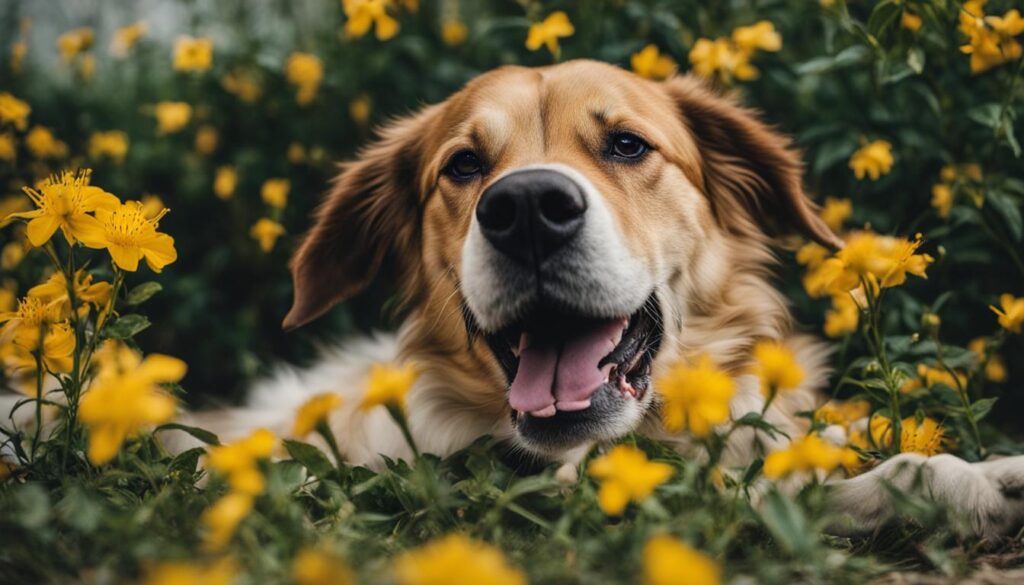Welcome to our informative article on honeysuckle and its potential toxicity to dogs. As responsible pet owners, it’s crucial to be aware of the plants that can pose a risk to our furry friends. In this section, we will explore whether honeysuckle is poisonous to dogs and what steps you can take to keep your canine companion safe from toxic plants.
Honeysuckle is known for its fragrant flowers and beautiful vines that adorn many gardens. However, when it comes to dogs, caution is necessary. Unfortunately, honeysuckle can be highly poisonous to our canine companions. It contains cyanogenic glycosides and carotenoids, which can cause severe symptoms in dogs when ingested.
Some common signs of honeysuckle poisoning in dogs include vomiting, irregular heartbeat, diarrhea, and extreme thirst. In severe cases, it can even lead to coma and death. Therefore, it’s vital to exercise extreme caution if you have honeysuckles in your yard or if your dog has access to them elsewhere.
To ensure the safety of your furry friend, it’s essential to be aware of other plants that can be toxic to dogs. In the next section, we will explore the common house and yard plants that pet owners should avoid to prevent accidental ingestion and poisoning. Stay tuned!
Common House and Yard Plants Poisonous to Dogs
When it comes to keeping your furry friends safe, it’s important to be aware of the common house and yard plants that can be toxic to dogs. Accidental ingestion of these plants can lead to serious health issues and even be life-threatening for your beloved pet. Here are some plants you should avoid having around your four-legged companion:
- Azaleas
- Begonias
- Daffodils
- Dandelions
- Ferns
- Fiddle Leaf Figs
- Gardenias
- Geraniums
- Hibiscus
- Honeysuckle
- Hostas
- Hydrangeas
- Impatiens
- Lantana
- Lavender
- Lilacs
- Lilies
- Marigolds
- Milkweed
- Monsteras
- Mums
- Orchids
- Peonies
- Poinsettias
- Pothos
- Roses
- Sago Palm
- Snake Plants
- Succulents
- Tulips
- Wisteria
It’s crucial to keep your dog away from these plants to prevent any accidental ingestion and potential poisoning. Even a small nibble can have severe consequences for your furry friend. Be sure to keep these plants out of your dog’s reach, whether indoors or in your yard.
Symptoms and Treatment of Honeysuckle Poisoning in Dogs
If you suspect that your dog has ingested honeysuckle or any other toxic plant, it’s important to be aware of the signs of poisoning. Honeysuckle poisoning in dogs can manifest with various symptoms, including:
- Discomfort and loss of appetite: Your dog may exhibit signs of discomfort, such as restlessness or refusing to eat.
- Thirst: Increased thirst can be a symptom of honeysuckle poisoning in dogs.
- Diarrhea and vomiting: Digestive disturbances, such as diarrhea and vomiting, are common symptoms of plant poisoning.
- Depression and confusion: Your dog may appear depressed or disoriented, exhibiting unusual behavior.
- Irregular heartbeat: Honeysuckle poisoning can affect your dog’s heart rhythm, leading to irregular heartbeats.
- Stomach rupture: In severe cases, honeysuckle poisoning can cause stomach rupture, which requires immediate veterinary attention.
If you notice any of these symptoms or suspect your dog has been exposed to honeysuckle or any other toxic plant, it’s crucial to seek immediate veterinary care. Only a veterinarian can provide the appropriate treatment and support needed to help your dog recover from plant poisoning.
Conclusion
Protecting your dog from plant toxicity is crucial for their safety and well-being. By being aware of the potential dangers posed by certain plants, you can create a pet-friendly environment that ensures your furry friend’s health. Avoid planting or bringing into your home any plants that are known to be toxic to dogs, including honeysuckle.
When designing your garden, consider dog-friendly gardening practices that prioritize pet safety. Choose non-toxic plants and flowers that are harmless to dogs. Some dog-friendly options include marigolds, sunflowers, petunias, and snapdragons. Create designated play areas and keep potentially harmful plants fenced off or out of reach.
Furthermore, ensure that your dog’s activities are supervised when they are outdoors to prevent accidental ingestion of toxic plants. Regularly inspect your garden for any signs of plant toxicity and promptly remove any hazardous plants or flowers. By implementing these precautions, you can enjoy a beautiful garden while keeping your four-legged companion safe and happy.
Can Honeysuckle Harm Dogs If Ingested?
Yes, honeysuckle can harm dogs if ingested. The berries contain toxins that can cause vomiting, diarrhea, and potential kidney failure. It’s important to keep pets away from honeysuckle plants to avoid any potential harm. Aloe, despite commonly being mistaken for a cactus, is actually a succulent plant.










